
Substance and the essence of Being
Substance is an essential concept of both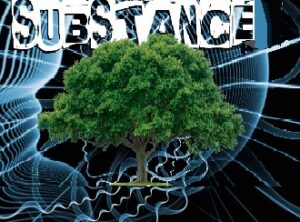 metaphysics and ontology, although modernity wants to characterize it only as that which is material, etymology says sub instance, or from Latin it literally means “what is below”, but it can also be “ derived from”.
metaphysics and ontology, although modernity wants to characterize it only as that which is material, etymology says sub instance, or from Latin it literally means “what is below”, but it can also be “ derived from”.
Dualism sees everything as opposition and affirmation, a primary substance is one that does not have the opposite disposition, for example, a man, a tree or an animal, its opposite does not exist, but it is not yet what designates Being, since these change, they are born with some original form and later modifying they are the foundation of something “derived”: an accident, a sub-instance of man, tree or some animal.
In the 17th century René Descartes proposed a division between body and mind, dividing substance into two categories: res extenso, which refers to physical matter, and res cogitans which refers to mind or thought, the simplified dualism as body and mind , in this century there were opposing ideas: the “atomist” monism of Leibniz and the natural monism of Spinoza.
In the 18th century, this idea underwent two reforms: Hume’s, who criticized the substance as something essential, being just an idea created by the human mind, to give meaning to experience, and Kant’s idealism, the substance is not a thing in itself, but a category of human understanding.
Still within the limits of Kantianism, there remain two possibilities of conceiving a being or an object, the immanent sense, which remains within the scope of possible experience, but acting only through the senses (concepts or cognitive principles) and the transcendent, which admits an immanent god , which permeates all reality and is not separated from matter.
The transcendent is then what takes the subject (hence it is called subjectivity) to the object (objectivity) allowing the concept or cognitive principle.
The idea of a person, or three people in the Christian case, is one that gives being (does not separate it from the object and experience) its transcendence and thus allows spiritual ascesis.
In the Christian case, I draw attention to the Resurrected Jesus who orders and roasts a fish and eats it, not out of necessity, but out of possibility, so he does not affect the substance although he conceives it.
The passage says (Luke 24, 40-43): “And saying this, Jesus showed them his hands and feet. But they still couldn’t believe it, because they were so happy and surprised. Then Jesus said, “Do you have anything to eat here?” They gave him a piece of roasted fish. He took it and ate it before them”, if he didn’t need it because he ate it, remember the last supper.
Me, the Other and the Hidden Third
The principle of uncertainty that came from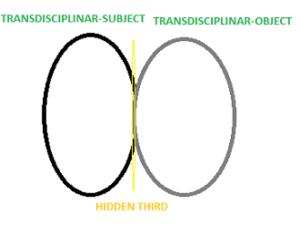 physics, starting with Heisenberg, at the beginning of the last century gradually put Physics in check, putting scientific determinism, logicism also in check due to Gödel’s paradox which determined that an axiological mathematical system or it is complete or consistent, and cannot be both at the same time, but a new scientific and ontological vision was emerging, Transdisciplinary Ontology.
physics, starting with Heisenberg, at the beginning of the last century gradually put Physics in check, putting scientific determinism, logicism also in check due to Gödel’s paradox which determined that an axiological mathematical system or it is complete or consistent, and cannot be both at the same time, but a new scientific and ontological vision was emerging, Transdisciplinary Ontology.
In the week of July 13 to 17, 2008, the 9th. The Metanexus Institute’s annual conference, held in Madrid, Spain, between philosophers, biologists, physicists, cosmologists, neuroscientists, cognitive scientists, historians, educators, theologians and community leaders took place with the theme “Subject, self, and Soul: Transdisciplinary approaches to Personhood”, where Barsarab Nicolescu was invited to open the Conference.
In it Nicolescu will develop the idea of the hidden third, philosophy had already spoken of the Other through Lévinas, Ricoeur and the educator Martin Buber, who in the book “I-Thou” recognizes in the other something “divine”, but stops there as the others, stop at the edge of the concept of otherness.
Nicolescu went ahead, writes like Heisenberg a model for overcoming the subject x object dualism, characteristic of modernity: “: “We can never reach an exact and complete portrait of reality (Heisenberger, 1998, p. 258). The incompleteness of the laws of physics is present in Heisenberg, even if he makes no reference to Gödel’s theorems. For him, reality is given as “textures of different types of connections”, as an “infinite abundance”, without any ultimate foundation” (Nicolesceu, 2008)
Citing Heisenberg, Nicolescu states, citing Husserl, Heidegger, Gadamer and Cassirer (whom he knew personally), that it is necessary to suppress any rigid distinction between Subject and Object.
The idea of the hidden subject in Nicolescu is beyond the threshold I and the Other, it is in the conception that comes from physics that there is a third state in nature, the Third Included beyond Being and Non-Being, he calls them the Transdisciplinary-Object and Subject-Transdisciplinary, in quantum physics it was already clear that the analysis of an Object phenomenon must be transdisciplinary due to a then unknown state in nature, now also a Transdisciplinary Subject is described by Nicolescu (calls it TD-Subject) which reveals the Hidden Third.
Although the theme talks about the soul and even talks about spirituality, for a good biblical reading it is necessary to understand the unveiling of Jesus after his death (appearance is a limited term) which reveals itself in a surprising and divine way to the disciples, the Hidden Third is Himself.
In the passage of disciples who are walking to Emmaus and a Third walker infiltrates among them, when they see the breaking of bread they will soon remember their “conversation”: “Then one said to the other: “Wasn’t our hearts burning when he spoke to us along the way, and explained the Scriptures to us?” (Luke 24:32).
Quantum physics, occult third and spirituality
Nicolescu Barsarab, in addition to formulating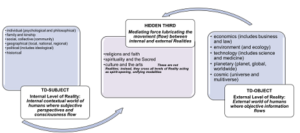 the theory of the included third, substantiating through quantum physics that Aristotle’s principle of the excluded third, there is A or non-A being exclusive, however quantum physics had already revealed a third state T, as a combination between the state of “existence” and “non-existence” as a physical state, this Being existing or not as a third state allows us to speak of a Transdisciplinary Ontology.
the theory of the included third, substantiating through quantum physics that Aristotle’s principle of the excluded third, there is A or non-A being exclusive, however quantum physics had already revealed a third state T, as a combination between the state of “existence” and “non-existence” as a physical state, this Being existing or not as a third state allows us to speak of a Transdisciplinary Ontology.
Succinctly, Nicolescu (2002) developed is that instead of one reality waiting to be discovered using the scientific method, there are multiple levels of Reality (he capitalizes Reality and uses the letter T for transdisciplinarity) organized into two levels.
One level concerns Subjective Reality (TD-Subject), so called because it deals with the internal flow of perspectives and consciousness. Included are individual psychology and philosophy, family, community, society, history and political ideologies. The other level concerns Objective Reality (TD-Object), so called because it deals with the external flow of information, facts, statistics and empirical evidence.
Examples include economics (business and law), technology, science and medicine, ecology and environment, planetary (worldwide and global), and cosmic and universe (Nicolescu, 2002, 2016).
Each level of Reality is different, but “each level is what it is because all levels exist at the same level”, the existence of a single level of reality, the disciplinary closure of knowledge, Edgar Morin also warns about this, creates a new type of obscurantism, of disciplinary closure in areas of knowledge.
Arrábida Transdisciplinarity Charter says in its preamble: “Considering that the contemporary rupture between an increasingly cumulative knowledge and an increasingly impoverished inner being leads to the rise of a new obscurantism, whose consequences, on the individual and social level, are incalculable ”, and says in his third article: “Transdisciplinarity is complementary to the disciplinary approach; it makes new data emerge from the confrontation of the disciplines that articulate them together; offers us a new vision of the nature of reality” (Arrábida, 2014).
The opening to the subject is not just about idealistic subjectivity, it is the opening to Being itself and what Transdisciplinary Ontology proposes is to see it in the complexity that is revealed.
Nicolescu, B. (2002) Manifesto of transdisciplinarity. New York, NY: SUNY Press.
Nicolescu, B. (2016) The Hidden Third [W. Garvin, Trans.]. New York, NY: Quantum Prose, 2016.
Freitas, L., Morin, E., Nicolescu, B. (1994) Portugal, Convento da Arrábida, november, 16, 1994.
Pre-war and hope for peace
Russia declared a state of war with Ukraine,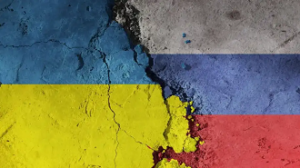 what changes are the methods and an increase in the limits of violence, the tactic is to bomb the entire country and especially the installations that supply energy, of course except the Atomic Power Plants, but it is not free from an “accident” that would be a severe blow across Europe.
what changes are the methods and an increase in the limits of violence, the tactic is to bomb the entire country and especially the installations that supply energy, of course except the Atomic Power Plants, but it is not free from an “accident” that would be a severe blow across Europe.
Ukraine in response has made incursions into Russia mainly to target oil plants and deposits, which is why the attack on Crimea has been strategic, and also why Russia has warned that it will not attack NATO forces, except F-fighters. 16.
In addition to Macron, who declared that he does not rule out, if necessary, sending troops to Ukraine, Polish Prime Minister Donald Tusk also warned that Europe is in a “pre-war” although he added that there is a “long way to go before facing the “threat” posed by Russia.
Polish Prime Minister Donald Tusk warned that Europe is in a “pre-war era” but still has a “long way to go” before it is ready to face the threat posed by Russia.
The recognition by most European governments that a war with Russia would not be simple is a brake on warmongering threats and opens a path to peace. There are already barely visible articulations in the mainstream press of attempts at agreements, which are seen as “secret ”, but it is not the truth, political and economic interests also act in this area.
The situation of humanitarian calamity and war remains between Israel and neighboring anti-Semitic forces, there is a danger that this feeling will become normalized where only the Palestinian side is emphasized, of course the people are never to blame for the war of the powerful, the Russian and Ukrainian people are also victims , but extreme warlike actions must be charged and punished.
The resistance of the spirit, a word coined by Edgar Morin, must be present in our minds and attitudes, ideological and cultural polarization throughout the world (the terrorist act in Russia has cultural connotations, it seems), must not feed our spirit.
We always hope for serenity, the recognition that everyone loses in a war, especially the innocent and civilians, but it feeds a powerful war industry that serves a perverse economy and hardens spirits.
For Christians, Easter is the victory over death, over hatred, it is a victory of peace.
Pain and the Palliative Society
By reading several authors, but mainly by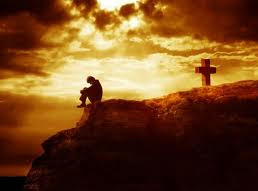 understanding precisely the “pains” of modernity, Byung Chul Han wrote the Paleative Society: pain Today (Han, 2021) in which he decrees: “Pain is now a meaningless evil, which must be combated with painkillers. As a mere bodily affliction, it falls entirely outside the symbolic order.” (HAN, 2021, p. 41).
understanding precisely the “pains” of modernity, Byung Chul Han wrote the Paleative Society: pain Today (Han, 2021) in which he decrees: “Pain is now a meaningless evil, which must be combated with painkillers. As a mere bodily affliction, it falls entirely outside the symbolic order.” (HAN, 2021, p. 41).
Among several authors, it is from Paul Valéry in his book and character Monsieur Teste, who embodies the modern and sensitive man who as meaningless and pure “bodily affliction”, “monsieur Teste remains silent in the face of pain. The pain steals his speech” (HAN, 2021, p. 43).
He will place the Christian mystic Teresa D’Ávila in contrast to this character, as a kind of counterfigure, “in her the pain is extremely eloquent. With pain begins the narrative. The Christian narrative verbalizes pain and also transforms the body of the mystic into a stage… it deepens the relationship with God… it produces an intimacy, an intensity.” (p. 44).
Freud also claims, “pain is a symptom that indicates a blockage in a person’s history. The patient, because of his block, is not in a position to move forward in the story” (p. 45).
Being a mere “bodily affliction”, pain became a thing, lost an ontological and in a certain way “eschatological” meaning (because it has a history with a beginning and an end), “meaningless pain is possible only in a bare life emptied of meaning , which no longer narrates.” (p. 46).
Modern man’s denial of the cross is not just contempt for the Other, it is the misunderstanding of its eschatological aspect, pain has entered our lives and will last until we can understand its meaning of “liberation”, of “purging” our evils. that are in our history, that are our sins, war is the misunderstanding of pain, the Other is eliminated as being to blame for our pain, of which each one of us is to blame.
Injustices have their own regulatory means, but marginality, crime, which arise in the midst of poverty, social difficulties are difficulties that deal with pain, there is always a way to remake a story, to start a life over, to eliminate it it’s the opposite.
Injustices have their own regulatory means, but marginality, crime, which arise in the midst of poverty, social difficulties are difficulties that deal with pain, there is always a way to remake a story, to start a life over, to eliminate it it’s the opposite.
The cross is the deepest meaning of what ails man, and from which he can free himself, hide or run away from the problem, which generally leads to greater pain: alcoholism, drugs, prostitution and what is already an evil of modern man: corruption at various levels.
The cross, the pride of Christians and the scandal of Gentiles, is also biblical: “he who wants to follow me, take up his cross and follow me (Mc 8, 34), a metaphor for victory and not defeat.
Han, Byung-Chul. (2021) The palliative Society: Pain Today. Transl. Daniel Steuer. USA: Polity Press.
Corpus Christi and spirituality
There are those who believe in transubstantiation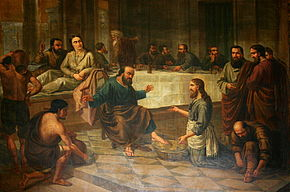 during the consecration of the host and wine during religious worship and those who think it is just something symbolic, others still believe the purest worship leads to salvation, and forget that it must be taken to the world , then there is the Eucharistic fulfillment among men and in the world.
during the consecration of the host and wine during religious worship and those who think it is just something symbolic, others still believe the purest worship leads to salvation, and forget that it must be taken to the world , then there is the Eucharistic fulfillment among men and in the world.
It is not surprising that a faith is quite fideistic (without works) and another that is quite worldly (only works are enough), this occurs inside and outside churches for obvious reasons, there is the Eucharist, that is, communion within the church must be carried out in the soul to the world, becoming a “world soul”.
For both Plotinus and Augustine of Hippo, the “soul” was the vision of the One, that is, of true communion and it is not done without God and is not realized if it is not taken to substance, in fact it is curious that bread and wine They are not substances of nature, they are made by man from wheat and grapes, so they are only realized in the “world soul” by the action of men in society.
Although the day was established by Pope Urban IV, 1264, to be celebrated on the Thursday after Holy Trinity Sunday, before he became pope he met a girl named Juliana who dreamed of this Eucharistic feast.
However, it is little told in history that the holiday was declared after a “miracle” that occurred in a church in Bolsena, Italy, by a priest who doubted Juliana’s visions, at the time of consecration, a moment in the Catholic mass that raises the bread and wine, blood began to flow and stain the corporal (cloth) on the altar.
Most non-Catholic Christian churches or those with Orthodox and Eastern rites celebrate only a symbolic supper that resembles Jesus’ last supper. Luther in the Protestant reform no longer used the term transubstantiation but rather consubstantiation, wine and bread, which are corporeal of blood and flesh. of Christ, but one of the leaders of the reform Ulrico Zwingli convinced the “reformed” that it was only a symbolic Lord’s Supper as a memorial of his death and resurrection.
Whatever the professed faith, communion with the One who is God and with men, its realization in humanity cannot be done without a true communion “among” men, In Greco-Roman churches this is done with the foot washing ceremony, remembering that Jesus washed the feet of the apostles (John 13:1-17) (above painting in Saint Maria del Mar, Barcelona).
The light and the truth
There is a single and true light, although we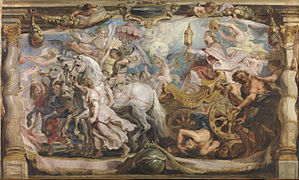 know that light can unfold into various colors that we see from red to violent, and that we do not see as infrared and ultraviolet.
know that light can unfold into various colors that we see from red to violent, and that we do not see as infrared and ultraviolet.
We are increasingly getting closer to the idea that the beginning of the universe had something like light, today according to Standard Physics Theory, the photon was already theorized by Einstein as particles or small “packages” that transport the energy contained in electromagnetic radiation, photons at rest they have zero mass.
Thus, the light that emanates from the origin of the Universe, although not confused with its intention (to radiate light), is at the origin of all electromagnetic radiation from the Big Bang.
The Neoplatonists, like Plotinus (205 – 270), believed in monism and in this radiation of light, there is a one or a god (it was not the Christian God) from which emanates a divine source that radiates throughout all creation, in this one light that Augustine of Hippo will rely on denying the Manichaean dualism that he had previously believed in and from there his turn towards Christianity will take place.
Plotinus’ texts were compiled by his disciple Porphyry and written in the work the Six Enneads (actually nine parts, as ennea in Greek is 9), in which the question of the union of the soul and the intellect stands out, it is based on this idea that the Truth dwells in man.
Thus the soul of the world proceeds from a creative power (not from power, as it does not define it), contemplating the Nous and multiplying itself in all the particular beings of the sensible world, without dividing itself (this is the interpretation of Fritz- Peter Hager in his 1962 book).
The truth thus dwells in the soul and interior of each man, it is this interiority that some critics define as the idealism or intimacy of the Neoplatonists, but today there are several works on the issue of the Contemplative Vitta, Hannah Arendt and Byung Chul Han remember it, but other authors have already started to mention Barthes’ Rumor of the Language mentioned in the previous post.
For Christians, this manifestation of truth occurs ontologically in the Incarnation, Passion and death of Jesus, death because it is part of human life and should be lived as an “Easter” passage that opens eternal life to men, without this passage life fullness is not realized and we perish as matter, this aspect is also problematized by Plotinus.
In the photo, Peter Paul Rubens’ work on Saint Augustine’s Anti-Milleranism, which did not accept the literal reading of Revelation 20:1-10.
Plotinus, Enéadas, (2021) transl. by José Seabra Filho and Juvino Alves Maia Junior, Brazil: Editora Nova Acropole (volume 6 was published this year, completing the work).
Augustine, Saint. (1999). A cidade de Deus (The city of God), trans. Oscar Paes Leme. Brazil, Petrópolis, Editora Vozes.
Silence and the resistance of the spirit
War is noisy not only in weapons and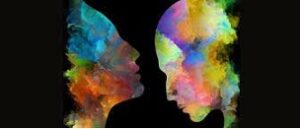 bombs, but mainly in the chatter it generates in which it is impossible to have serenity, think and dialogue; the noisy aspect is a fundamental part of the insanity it represents.
bombs, but mainly in the chatter it generates in which it is impossible to have serenity, think and dialogue; the noisy aspect is a fundamental part of the insanity it represents.
The resistance of the spirit, we are following Edgar Morin’s line, is the possible “weapon” at this moment and perhaps in even worse futures, it means, in many moments, remaining silent, making a silence so profound that it questions the Other who does not give up on argue your reasons for war.
In the Plotinus philosophy, which deeply influenced Saint Augustine, although they are different thinkers, one Christian and the other just Stoic, silence is a stage of deep knowledge of reality, of the one, unity that encompasses everything without leaving itself.
For him when an aspirant to truth (which is truth in fact, not rational logic), he has to have the experience of unity, this experience is total and silent.
The Brazilian philosopher Giacóia Junior seeks in Espinoza’s quote to reflect on this perspective of the relationship between noise and silence when he states that “certainly the fate of humanity would be happier if it were equally within man’s power to both speak and remain silent. But experience teaches sufficiently and superabundantly that nothing is less in the power of men than their language (…) (cf. GIACOIA JUNIOR, 2014, P. 79).
To be faced with silence is to be faced with truth, and if language is the home of being, it is worth remembering that the Word became flesh (John 1:1) if it is not accepted in the biblical sense, it can be thought of as an ontogenic or Phylogenic, as Barthes states in his book The Rumor of Language, states that: “it is language that teaches the definition of man” and that it cannot be considered “a simple instrument, utilitarian or decorative, of thought. Man does not pre-exist language, neither phylogenetically nor ontogenetically” (BARTHES, 1988, p.185).
Thus truth is a Being, language is the dwelling of Being and silence is its apex.
BARTHES, R. 1998. O Rumor da língua (The Rumor of Language). Brazil, São Paulo: Brasiliense.
GIACOIA JUNIOR, O. (2014) Por mais horas silenciosas (For quieter hours”)in: NOVAES, Mutações. Brazil, São Paulo: Ed. SESC SP.
Declared war and dangers
After Russia openly declared that it is at war with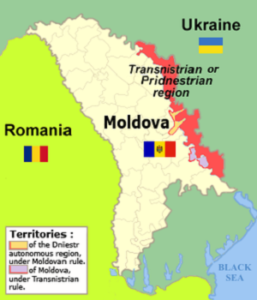 Ukraine in a week of heavy missile attacks on Kiev, including using Polish airspace, which generated tension, Ukraine responded with another major attack on Crimea and oil refineries.
Ukraine in a week of heavy missile attacks on Kiev, including using Polish airspace, which generated tension, Ukraine responded with another major attack on Crimea and oil refineries.
The West was on alert because the price of oil is expected to rise, and tension with NATO and Europe is already at high levels, statements by Putin and Macron with provocations from both sides, the placement of Russian troops on the Finnish border, and an Islamic State attack on a concert hall in Moscow.
From the beginning, the climate of tension has been at its highest this week of Holy Week, there will be no shortage of false prophets and hate mongers to make the situation worse, as Eduardo Galeano said about war, what the hatred of war did not do to the complete media, There have always been cold analysts who think of war as politics since Sun Tzu on the art of war, until Carl von Clausewitz was resurrected to justify the unjustifiable “art” of War.
The small autonomous territory of Transnistria (image) was shaken by the downing of a military helicopter, is within Moldova and governed by pro-Russian forces and is a cause of fear for Moldova, which is a member of NATO.
On the other dangerous front, among the many wars across the planet is the crisis in Palestine, it is another war of strong polarization, where the solution to the crisis seems distant, with increasing hatred from both sides and which could spread throughout the Middle East. .
In addition to the oil problem, the dangerous increase in maritime circulation of grains and industrialized products could generate a supply crisis and affect the problem of hunger, which is already common in many areas of the planet.
This is not an apocalyptic or prophetic vision, if it exists it is for a few and the majority are charlatans and speculators, but the civilizational crisis already has a very visible horizon.
Edgar Morin and other calm and common-sense analysts call for “resistance of the spirit”, not allowing oneself to be contaminated by this climate of hatred, violence and terror that plagues almost all four corners of the planet.
Keep your soul and heart pure and a strong spirit that faces the storms.
Truth and good works
There is no ontological truth where the unveiling of being does not occur, and this depends on its deeper realization in contact with its essence and must bear fruit for life, for personal and social well-being and for those who believe for an eternity.
of being does not occur, and this depends on its deeper realization in contact with its essence and must bear fruit for life, for personal and social well-being and for those who believe for an eternity.
Sophists in ancient times created truths that could even be logical, but the objective was to gain power and benefit from those who had wealth and influence, and this has not been eliminated from everyday life until today, a large part of politics is the negotiation of public goods, fraud and for this they use non-truth, and this is not the monopoly of one group.
There is no way to maintain this logic without authoritarianism, the restriction of freedom and silencing the voices of those who suffer from greed for power and wealth, a large part of the current crisis comes from these values, even if they blame the media, they are also under control of these powers.
The media follow the ontic logic in the ontological difference, we briefly develop this issue of the way Heidegger and other followers of the different ontological currents see it, in the scope of interpretation and dialogue the logic cannot be ontic, it must follow the ontological truth that follows from fusion of horizons in the hermeneutic circle (see previous post).
Dualism and polarization follow the ontic truth, blaming the media that do nothing that they do not have under control in some way, which could even be algorithms, man himself, thus the dual ontic logic used is instrumental and in a certain way sophistical because it aims the power.
On Sunday, Holy Week begins for Christians, the ontological truth that was manifested as being in the person of Jesus had to be destroyed by the discourse of power, even the religious power of the time that could not believe that truth is the logic of Being and man, when he manifested his good works, almost always confronted power.
It is necessary to go against the current to reverse the logic of ease, of easy money through corruption, of power for power’s sake and of disservice to society.

